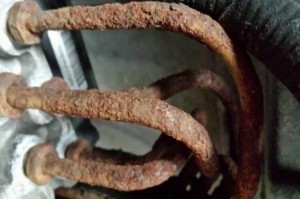Why Brake Lines Rust and How To prevent it
Why do brake lines rust So fast today, and what does it mean?
 What chemistry books define as an iron oxide formed by the redox reaction between oxygen and iron in the presence of moisture is a real issue among cars in this day and age. If a car isn’t maintained properly corrosion-wise, the brake lines can fail as easily as falling off a log.
What chemistry books define as an iron oxide formed by the redox reaction between oxygen and iron in the presence of moisture is a real issue among cars in this day and age. If a car isn’t maintained properly corrosion-wise, the brake lines can fail as easily as falling off a log.
Surface rust Seems to quickly evolve into penetration. We attribute this to many of the liquid Road brine solutions being applied in place of traditional rock salt to the roads today.

You don’t want to risk damaging your brakes and endangering your safety as well as other drivers’ safety. This article will try to cover everything you need to know about brake line rusting, what it means, how to remove it and long-term rust prevention.
What’s rusting brake lines?
It turns out that managing our winter weather and environmental concerns has precipitated changes in the way local communities have dealt with managing the snow and ice on the streets.
Local communities in our area used to salt the streets exclusively with rock salt. For many years now have been spraying the streets with an anti-icing formula consisting of a salt brine solution with liquid calcium chloride and beet juice or corn syrup. While this salt brine solution helps melt snow and ice, it also easily coats the undercarriage of our customers’ cars and trucks and allows moisture to create an acid that corrodes and rusts these metal parts.
There have been multiple recall operations in the US because of this vulnerability. According to the NHTSA, roughly seven years of exposure to winter road salts is enough for the model year 2007 vehicle to be susceptible to brake line corrosion.
Is Rust on Your Brake Discs Dangerous?
It is very easy for rust to build-up along with brakes not only because they are made from steel but more-so because of the combination of steel and the moisture-retaining, dark, and humid location of your car’s brakes.
Over time, without proper maintenance, regular driving, and properly-fitting brake pads – yes, it can become dangerous. However, most of the time, regular driving prevents the rusting from reaching the point of being hazardous.
Typically, you will replace the brakes before they can become a danger because of rust.
What steps in the preparation of new brake lines can be taken to decrease the effects of corrosion?
In our opinion, Oil-based rustproofing is the most forgiving way to treat auto corrosion and rusted brake lines.
NH Oil Undercoating® is applied, you can expect it to lift and remove dirt, moisture, other contaminants, and even some surface rust. It is designed to penetrate the good metal and form its protection there. It will continue to penetrate to the good metal, pushing out existing moisture and oxygen, thus eliminating oxidation-corrosion.

 Buy US Direct
Buy US Direct Buy CA Direct
Buy CA Direct Buy EU Direct
Buy EU Direct Buy DE Direct
Buy DE Direct